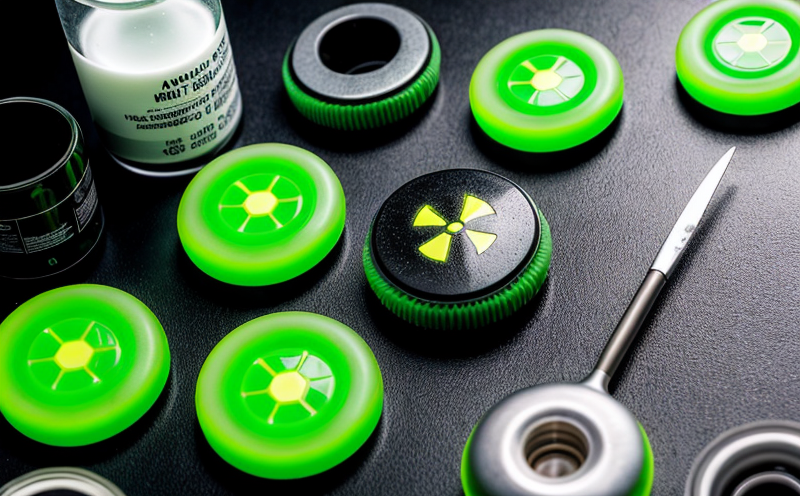EN 17807 Cesium-137 Detection in Milk Powder
The European Standard EN 17807 specifies a method for determining the amount of 137Cs in milk powder. This standard is crucial for ensuring that food safety and quality are maintained, especially concerning radioactive contaminants. The detection of cesium-137 (a by-product of nuclear fission) is critical due to its potential for accumulation in human diets and the associated health risks.
Milk powder is a significant component in infant formula and various dietary supplements. Ensuring that milk powder meets stringent safety standards is essential, not only for consumer protection but also for maintaining brand reputation and regulatory compliance. This process involves several key steps:
1. Specimen Preparation
The first step in the testing procedure is to accurately prepare the sample. Milk powder samples are typically weighed and ground into a fine powder using specialized equipment, ensuring that all parts of the sample are evenly distributed for consistent results.
2. Instrumentation and Techniques
The detection process relies on gamma spectrometry, a highly sensitive method capable of identifying minute amounts of cesium-137. Gamma rays emitted by radioactive isotopes can be accurately measured using high-purity germanium detectors, which are calibrated to specific energy levels.
3. Standardization and Calibration
Standardization is critical for ensuring accurate results. Reference materials certified under relevant standards (such as IAEA reference samples) are used to calibrate the instrumentation accurately. This ensures that any detected cesium-137 can be quantified precisely.
4. Data Analysis and Reporting
The collected data from gamma spectrometry is analyzed using proprietary software, which applies algorithms based on international standards (ISO, ASTM) to calculate the concentration of 137Cs in the milk powder sample. The results are reported as parts per million (ppm), with a detection limit typically around 0.5 Bq/kg.
5. Regulatory Compliance and Documentation
Compliance with EN 17807 ensures that food safety standards are met, which is vital for regulatory approval. Documentation of the entire process, including sample preparation, calibration, analysis, and results, must be maintained meticulously to ensure traceability.
6. Quality Control
To maintain consistent quality and reliability, a robust quality control program is essential. This includes regular proficiency testing with reference materials and internal audits to verify the accuracy of test results.
The importance of detecting cesium-137 in milk powder cannot be overstated. Radioactive contamination can have severe health implications, making it imperative that food safety regulations are strictly adhered to. By leveraging advanced analytical techniques and stringent quality control measures, laboratories like ours provide reliable and accurate testing services for the food and feed industry.
Applied Standards
The primary standard used in this process is EN 17807: Determination of 137Cs in milk powder, which specifies the method for determining the concentration of cesium-137. This European Standard ensures that testing is consistent and accurate across different laboratories. The test procedure involves the use of gamma spectrometry to measure the emitted gamma rays from cesium-137.
For additional context, relevant international standards such as ISO 5725 (accuracy in measurement) and ASTM E1655 (methods for determining radioactivity in food products) are often referenced. These standards provide a framework for ensuring that the testing process is robust and reliable, meeting both European and global regulatory requirements.
The use of these standards ensures that the results obtained from our laboratory are credible and can be relied upon by quality managers, compliance officers, R&D engineers, and procurement teams involved in food safety and quality assurance processes. Compliance with such standards not only meets legal and regulatory requirements but also enhances consumer trust and confidence.
Industry Applications
The application of EN 17807 is particularly relevant in the food and feed industry, where ensuring the safety and quality of products is paramount. This test plays a crucial role in verifying that milk powder does not contain unsafe levels of radioactive contaminants such as cesium-137.
For infant formula manufacturers, this service ensures that the ingredients used are safe for consumption by infants and young children, thereby protecting public health. Additionally, regulatory bodies use these results to enforce food safety laws and guidelines, ensuring that products meet stringent quality standards.
In research and development (R&D) settings, testing for cesium-137 contamination helps in identifying potential sources of radioactive materials in the supply chain. This information is invaluable for improving product formulations and sourcing practices.
Procurement teams also benefit from this service by ensuring that only safe and compliant suppliers are selected. By leveraging our EN 17807 testing, they can make informed decisions about ingredient purchases, reducing the risk of contamination and ensuring compliance with international standards.
Eurolab Advantages
At Eurolab, we pride ourselves on offering comprehensive and reliable testing services for food and feed safety. Our expertise in EN 17807 ensures that our clients receive accurate and consistent results, which are critical for maintaining compliance with European regulations.
World-Class Equipment
We employ the latest gamma spectrometry equipment to ensure precise detection of cesium-137. This technology is supported by robust quality control measures, ensuring that every test result is reliable and accurate.
Experienced Professionals
Our team consists of highly skilled scientists and technicians with extensive experience in food safety testing. They are committed to providing expert guidance and support throughout the testing process, ensuring that clients understand their results fully.
Comprehensive Reporting
We provide detailed reports that include all relevant data and analysis, along with recommendations for corrective actions if necessary. This comprehensive approach ensures that our clients have a clear understanding of the situation and can take appropriate steps to maintain compliance.
Regulatory Expertise
Our professionals are well-versed in European regulations and can provide advice on how to meet these requirements effectively. We stay updated with the latest standards and guidelines, ensuring that our services remain relevant and effective.
Client Satisfaction
We prioritize client satisfaction by offering timely service delivery, clear communication, and personalized support. Our goal is to build long-term relationships based on trust and reliability.





